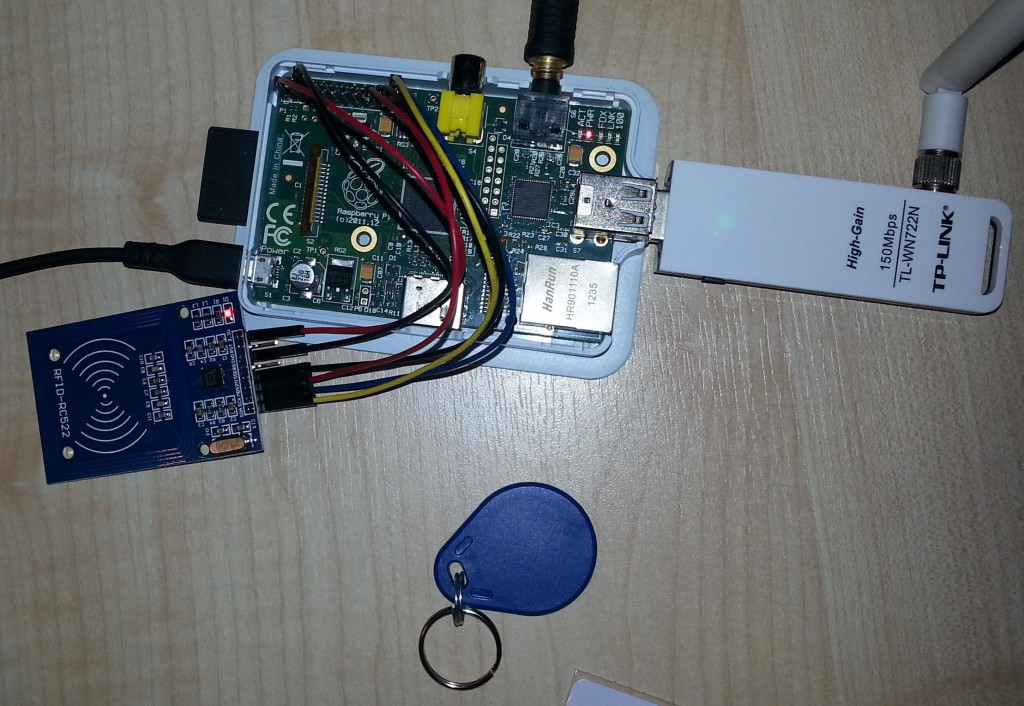One thing that has bothered me for quite some time about my beagleboard home automation “server” is that the various USB dongles that use the USB to serial interface show up under random ttyUSBX device names on each reboot.
So I finally got around to writing couple of udev rules that would create necessary symlinks that will always point to the correct device.
First let’s see what devices are attached to the USB bus:
root@beaglemonitor:# lsusb
Bus 002 Device 026: ID 04fa:2490 Dallas Semiconductor DS1490F 2-in-1 Fob, 1-Wire adapter
Bus 002 Device 025: ID 13b1:0018 Linksys USB200M 10/100 Ethernet Adapter
Bus 002 Device 003: ID 0403:6001 Future Technology Devices International, Ltd FT232 USB-Serial (UART) IC
Bus 002 Device 004: ID 0403:6001 Future Technology Devices International, Ltd FT232 USB-Serial (UART) IC
Bus 002 Device 002: ID 0424:2507 Standard Microsystems Corp.
Bus 002 Device 001: ID 1d6b:0002 Linux Foundation 2.0 root hub
Bus 001 Device 001: ID 1d6b:0002 Linux Foundation 2.0 root hub |
Currently this system only has two usb-serial converters attached, but both have the same ID so we have to use something more specific in order to distinquish between the two.
One way to get see what parameters are available is with lsusb -v but we will go with udevadm which gives output in a format that can be directly copy-pasted to the rule file.
root@beaglemonitor# udevadm info -a -p `udevadm info -q path -n /dev/ttyUSB1`
custom logging function 0x2a026008 registered
selinux=0
calling: info
device 0x2a0260e8 has devpath '/devices/platform/musb_hdrc/usb2/2-1/2-1.4/2-1.4:1.0/ttyUSB1/tty/ttyUSB1'
custom logging function 0x2a026008 registered
selinux=0
calling: info
device 0x2a0260e8 has devpath '/devices/platform/musb_hdrc/usb2/2-1/2-1.4/2-1.4:1.0/ttyUSB1/tty/ttyUSB1'
Udevadm info starts with the device specified by the devpath and then
walks up the chain of parent devices. It prints for every device
found, all possible attributes in the udev rules key format.
A rule to match, can be composed by the attributes of the device
and the attributes from one single parent device.
looking at device '/devices/platform/musb_hdrc/usb2/2-1/2-1.4/2-1.4:1.0/ttyUSB1/tty/ttyUSB1':
KERNEL=="ttyUSB1"
SUBSYSTEM=="tty"
DRIVER==""
device 0x2a026350 has devpath '/devices/platform/musb_hdrc/usb2/2-1/2-1.4/2-1.4:1.0/ttyUSB1'
looking at parent device '/devices/platform/musb_hdrc/usb2/2-1/2-1.4/2-1.4:1.0/ttyUSB1':
KERNELS=="ttyUSB1"
SUBSYSTEMS=="usb-serial"
DRIVERS=="ftdi_sio"
ATTRS{latency_timer}=="1"
ATTRS{port_number}=="0"
device 0x2a0265f8 has devpath '/devices/platform/musb_hdrc/usb2/2-1/2-1.4/2-1.4:1.0'
looking at parent device '/devices/platform/musb_hdrc/usb2/2-1/2-1.4/2-1.4:1.0':
KERNELS=="2-1.4:1.0"
SUBSYSTEMS=="usb"
DRIVERS=="ftdi_sio"
ATTRS{bInterfaceNumber}=="00"
ATTRS{bAlternateSetting}==" 0"
ATTRS{bNumEndpoints}=="02"
ATTRS{bInterfaceClass}=="ff"
ATTRS{bInterfaceSubClass}=="ff"
ATTRS{bInterfaceProtocol}=="ff"
ATTRS{modalias}=="usb:v0403p6001d0600dc00dsc00dp00icFFiscFFipFF"
ATTRS{supports_autosuspend}=="0"
ATTRS{interface}=="FT232R USB UART"
device 0x2a026ab8 has devpath '/devices/platform/musb_hdrc/usb2/2-1/2-1.4'
looking at parent device '/devices/platform/musb_hdrc/usb2/2-1/2-1.4':
KERNELS=="2-1.4"
SUBSYSTEMS=="usb"
DRIVERS=="usb"
ATTRS{configuration}==""
ATTRS{bNumInterfaces}==" 1"
ATTRS{bConfigurationValue}=="1"
ATTRS{bmAttributes}=="a0"
ATTRS{bMaxPower}==" 90mA"
ATTRS{urbnum}=="488"
ATTRS{idVendor}=="0403"
ATTRS{idProduct}=="6001"
ATTRS{bcdDevice}=="0600"
ATTRS{bDeviceClass}=="00"
ATTRS{bDeviceSubClass}=="00"
ATTRS{bDeviceProtocol}=="00"
ATTRS{bNumConfigurations}=="1"
ATTRS{bMaxPacketSize0}=="8"
ATTRS{speed}=="12"
ATTRS{busnum}=="2"
ATTRS{devnum}=="4"
ATTRS{devpath}=="1.4"
ATTRS{version}==" 2.00"
ATTRS{maxchild}=="0"
ATTRS{quirks}=="0x0"
ATTRS{avoid_reset_quirk}=="0"
ATTRS{authorized}=="1"
ATTRS{manufacturer}=="FTDI"
ATTRS{product}=="FT232R USB UART"
ATTRS{serial}=="A100dj0d"
device 0x2a0273d0 has devpath '/devices/platform/musb_hdrc/usb2/2-1'
looking at parent device '/devices/platform/musb_hdrc/usb2/2-1':
KERNELS=="2-1"
SUBSYSTEMS=="usb"
DRIVERS=="usb"
ATTRS{configuration}==""
ATTRS{bNumInterfaces}==" 1"
ATTRS{bConfigurationValue}=="1"
ATTRS{bmAttributes}=="e0"
ATTRS{bMaxPower}==" 2mA"
ATTRS{urbnum}=="430"
ATTRS{idVendor}=="0424"
ATTRS{idProduct}=="2507"
ATTRS{bcdDevice}=="0000"
ATTRS{bDeviceClass}=="09"
ATTRS{bDeviceSubClass}=="00"
ATTRS{bDeviceProtocol}=="01"
ATTRS{bNumConfigurations}=="1"
ATTRS{bMaxPacketSize0}=="64"
ATTRS{speed}=="480"
ATTRS{busnum}=="2"
ATTRS{devnum}=="2"
ATTRS{devpath}=="1"
ATTRS{version}==" 2.00"
ATTRS{maxchild}=="7"
ATTRS{quirks}=="0x0"
ATTRS{avoid_reset_quirk}=="0"
ATTRS{authorized}=="1"
device 0x2a027c10 has devpath '/devices/platform/musb_hdrc/usb2'
looking at parent device '/devices/platform/musb_hdrc/usb2':
KERNELS=="usb2"
SUBSYSTEMS=="usb"
DRIVERS=="usb"
ATTRS{configuration}==""
ATTRS{bNumInterfaces}==" 1"
ATTRS{bConfigurationValue}=="1"
ATTRS{bmAttributes}=="e0"
ATTRS{bMaxPower}==" 0mA"
ATTRS{urbnum}=="76"
ATTRS{idVendor}=="1d6b"
ATTRS{idProduct}=="0002"
ATTRS{bcdDevice}=="0206"
ATTRS{bDeviceClass}=="09"
ATTRS{bDeviceSubClass}=="00"
ATTRS{bDeviceProtocol}=="00"
ATTRS{bNumConfigurations}=="1"
ATTRS{bMaxPacketSize0}=="64"
ATTRS{speed}=="480"
ATTRS{busnum}=="2"
ATTRS{devnum}=="1"
ATTRS{devpath}=="0"
ATTRS{version}==" 2.00"
ATTRS{maxchild}=="1"
ATTRS{quirks}=="0x0"
ATTRS{avoid_reset_quirk}=="0"
ATTRS{authorized}=="1"
ATTRS{manufacturer}=="Linux 2.6.35.9-x9 musb-hcd"
ATTRS{product}=="MUSB HDRC host driver"
ATTRS{serial}=="musb_hdrc"
ATTRS{authorized_default}=="1"
device 0x2a0286d8 has devpath '/devices/platform/musb_hdrc'
looking at parent device '/devices/platform/musb_hdrc':
KERNELS=="musb_hdrc"
SUBSYSTEMS=="platform"
DRIVERS=="musb_hdrc"
ATTRS{modalias}=="platform:musb_hdrc"
ATTRS{mode}=="a_host"
ATTRS{vbus}=="Vbus off, timeout 1100 msec"
device 0x2a028a58 has devpath '/devices/platform'
looking at parent device '/devices/platform':
KERNELS=="platform"
SUBSYSTEMS==""
DRIVERS=="" |
As the message at the beginning of the output tells us we can use parameters from the child and one of the parents in the rule.
So assuming that I have somehow determined that at the moment device /dev/ttyUSB1 is a Plugwise dongle and I would like to create a symlink
/dev/plugwise for it in the future would lead us to the following udev rule:
KERNEL=="ttyUSB*", ATTRS{idVendor}=="0403", ATTRS{idProduct}=="6001", ATTRS{serial}=="A100dj0d", SYMLINK+="plugwise" |
So lets create a configuration file for it and restart the udev:
root@beaglemonitor# echo 'KERNEL=="ttyUSB*", ATTRS{idVendor}=="0403", ATTRS{idProduct}=="6001", ATTRS{serial}=="A100dj0d", SYMLINK+="plugwise"' > /etc/udev/rules.d/zz-plugwise.rules
root@beaglemonitor# /etc/init.d/udev restart
Stopping the hotplug events dispatcher: udevd.
Starting the hotplug events dispatcher: udevd.
root@beaglemonitor# ls -alFs /dev/plugwise
0 lrwxrwxrwx 1 root root 7 Dec 24 15:14 /dev/plugwise -> ttyUSB1 |
Based on a similar process the other device will get the following rule:
KERNEL=="ttyUSB*", ATTRS{idVendor}=="0403", ATTRS{idProduct}=="6001", ATTRS{serial}=="A600asCw", SYMLINK+="greenhouse" |
